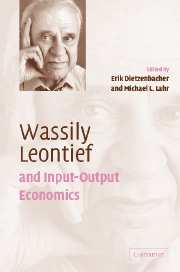Book contents
- Frontmatter
- Contents
- List of contributors
- List of figures
- List of tables
- Preface
- Part I Reflections on input-output economics
- 1 A portrait of the master as a young man
- 2 Leontief's “magnificent machine” and other contributions to applied economics
- 3 Leontief and the future of the world economy
- 4 International trade: evolution in the thought and analysis of Wassily Leontief
- 5 Leontief's input-output table and the French Development Plan
- 6 Leontief and dynamic regional models
- 7 Experiences with input-output and isomorphic analytical tools in spatial economics
- 8 Leontief and Schumpeter: a joint heritage with surprises
- 9 Some highlights in the life of Wassily Leontief – an interview with Estelle and Wassily Leontief
- Part II Perspectives of input-output economics
- Subject index
- Author index
4 - International trade: evolution in the thought and analysis of Wassily Leontief
Published online by Cambridge University Press: 22 September 2009
- Frontmatter
- Contents
- List of contributors
- List of figures
- List of tables
- Preface
- Part I Reflections on input-output economics
- 1 A portrait of the master as a young man
- 2 Leontief's “magnificent machine” and other contributions to applied economics
- 3 Leontief and the future of the world economy
- 4 International trade: evolution in the thought and analysis of Wassily Leontief
- 5 Leontief's input-output table and the French Development Plan
- 6 Leontief and dynamic regional models
- 7 Experiences with input-output and isomorphic analytical tools in spatial economics
- 8 Leontief and Schumpeter: a joint heritage with surprises
- 9 Some highlights in the life of Wassily Leontief – an interview with Estelle and Wassily Leontief
- Part II Perspectives of input-output economics
- Subject index
- Author index
Summary
Introduction
Most contemporary research about international trade assumes that a nation's comparative advantage is a major determinant of the amount and mix of its imports and exports. Comparative advantage may refiect a country's fortune regarding natural endowments or, more generally, a variety of considerations that affect its cost structures relative to those of potential trade partners. Over the course of the twentieth century, the Heckscher-Ohlin theory of international trade was expanded in various directions and formulated in ways that lent themselves to analytic representation and quantification through systems of equations expressed in terms of variables and parameters. Theorems were stated and proved, and data were collected to test hypotheses and the basic theory itself. The work of Wassily Leontief contributed significantly at every stage of this progress.
Despite all this work, the empirical results of investigations of comparative advantage have been at odds with expectations from theory so frequently that some contemporary researchers have turned to explaining trade by other mechanisms. I believe, however, that the extent of the explanatory power of comparative advantage remains to be demonstrated and that, while Leontief left an unfinished research agenda, his later work indicates research directions that others will pursue in deepening our understanding of comparative advantage in the world economy.
Between 1933 and 1977 Wassily Leontief published four articles, two reviews of the work of other economists, his Nobel Memorial Lecture, and one book on international trade.
- Type
- Chapter
- Information
- Wassily Leontief and Input-Output Economics , pp. 47 - 64Publisher: Cambridge University PressPrint publication year: 2004
- 8
- Cited by



